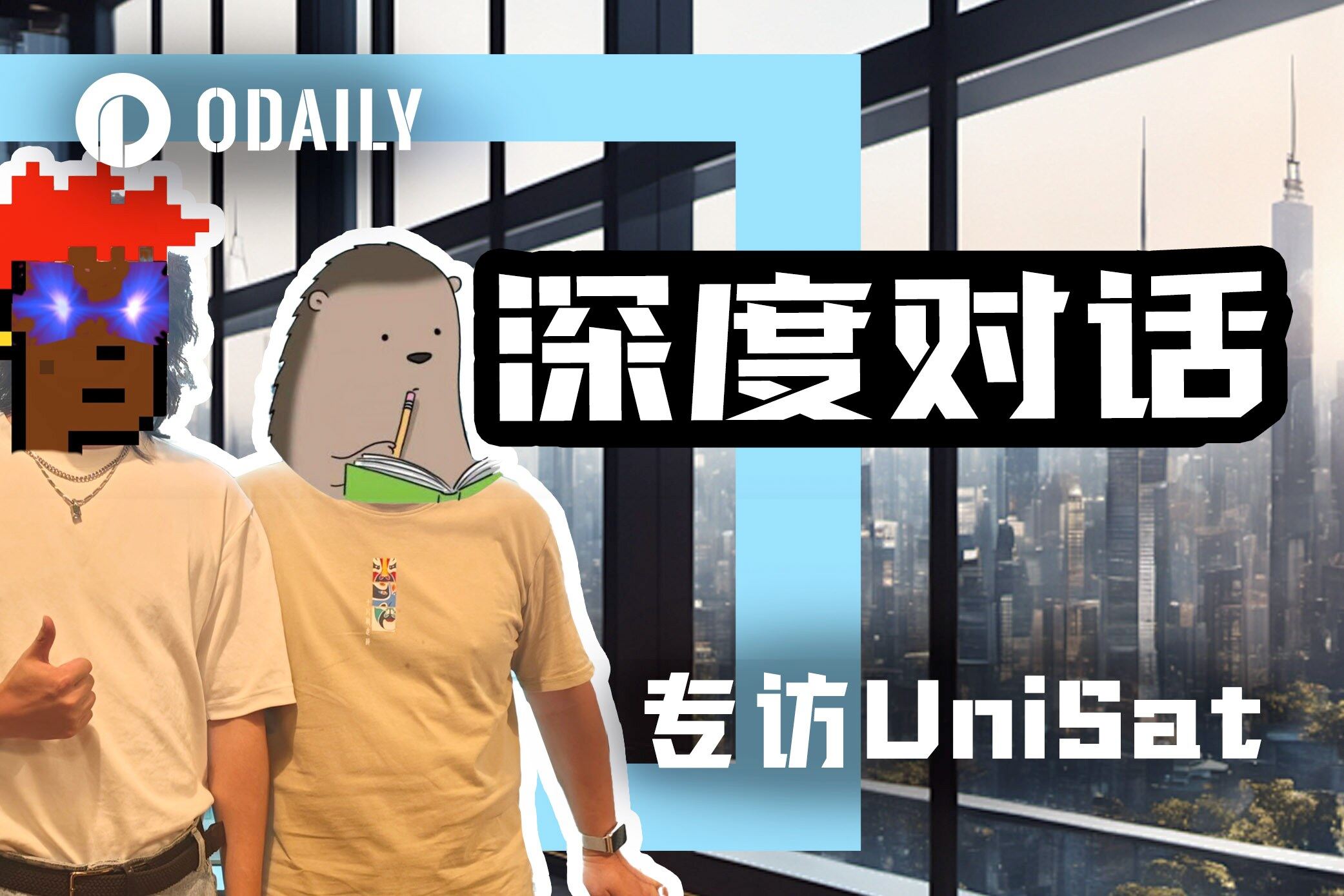原创 | Odaily 星球日报(@OdailyChina)
作者|Golem(@web 3_golem)
“我原本在游戏行业待了十几年,2018 年来到 Crypto 行业实际带着半退休的心态,根本没想过一定要成功或者做到行业第一”,在 UniSat 香港办公处的一间会议室里,创始人 Lorenzo 回顾了 UniSat 的创业历程,眼神中透露出的是平静与祥和。
Bitcoin Asia 期间,我有幸采访到了 UniSat 创始人 Lorenzo。初次见面,80 后 Lorenzo 着装朴素,眼神中没有创业者的锐利而是充满了随和,如果将其放在人群中,也不是会引起关注的那一类,但这也拉近了我们之间的距离。采访开始前,Lorenzo 正在阅读香港当天的《民报》,在如今这个纸媒被淘汰的时代,仍阅读纸质报纸的人并不多见。虽然 Lorenzo 职业生涯前后处于游戏和 Crypto 这两个迭代非常快的行业,但他本人依然比较传统。
“中国的传统文化对我影响很大,我平时会研读道家的著作,所以很多时候我应对工作也是一种顺其自然的处理方式。”
在比特币生态火爆时期,UniSat占据了重要的生态位,甚至它的一些动作会影响某些标的产生价格波动。但随着比特币生态势微,秉承“顺其自然”态度的UniSat又在想些什么、做些什么呢?在本次采访中,Lorenzo介绍了UniHexa和UniSat冷钱包等产品、解释了FB币价持续下跌的原因、首次表面了对比特币生态新协议的态度,以及牛熊转换下对团队的影响。Odaily星球日报现将访谈整理如下,enjoy~
UniSat 最近都在做什么?
Odaily:随着比特币生态今年热度降低,UniSat 受关注度也相对降低了,很多媒体对你们的报道停留在了今年 4 月份不再支持 Atomicals 协议阶段。但实际上 UniSat 在最近这一两个月做了很多重要动作,你能够简单介绍一下吗?
Lorenzo:我们已经感受过好几个市场小周期的冷暖了,我们对市场一直保持的是一颗平常心。但在受关注度没那么高的时期,对我们来说反而是赢得了更多的时间去做点有意义的事。
今年上半年比较重要的是我们支持了一个新协议——Alkanes,我们当时专门写了一篇文章来解释为什么要支持 Alkanes。下半年我们主要关注的就是 BRC 20 的升级(如单步转移、BRC 2.0 升级),以及我们即将发布的冷钱包产品,还有一个就是我们开发的比特币原生资产混合交易引擎——UniHexa。
Odaily:还有一个我注意到的产品迭代是 PizzaSwap 宣布取消存提款操作,能够直接进行交易。但是现在 UniSat 推出了 UniHexa,它与 PizzaSwap 的定位有什么区别?
Lorenzo:UniHexa 是我们今年下半年的重中之重,9 月份我们会进行邀请制测试、第四季度会公开上线。因为随着我们支持的协议越来越多,协议之间不可避免的存在流动性碎片化和割裂,所以我们认为需要一个统一的框架来把它们整合起来。
UniHexa 和 PizzaSwap 这两个产品是生态互补的。UniHexa 建立在比特币主网上,PizzaSwap 建立在 fractal 上;UniHexa 是对多种不同协议的兼容(如 BRC 20、Runes 和 Alkanes),而 PizzaSwap 就是围绕 BRC 20 为中心建设的,一个是广度优先,一个是深度优先;UniHexa 是传统的订单簿模式,而 PizzaSwap 则是 AMM 模式。
Odaily:刚刚提到了冷钱包,UniSat 做冷钱包的初衷是什么?这个钱包的产品形态是怎样的?
Lorenzo:UniSat 现在有浏览器插件钱包和手机 APP 版钱包,但我们发现还是很难同时兼顾便捷性和安全性。因为对一些用户来说,理解助记词的重要性并切实执行保护助记词,门槛还是太高了。所以我们能做的是,一方面多准备一些教育性的材料,另一方面是给用户提供一些更高安全水准的产品。
我们很快会支持 Ledger、Trezor 这些硬件钱包,但它们的安全性没有高到一个我们认为的非常“严肃”的水准,所以我们就产生了自己做冷钱包的想法。
“一个冷钱包实际上只要够冷就可以了”,既然用户资产是自己保管的,那么就得用他自己信得过的载体。所以我们的选择是让用户使用自己的移动设备来充当载体,比如自己淘汰的一个二手手机,只要断网后它就是个非常安全的离线设备,而且这个设备是用户信得过的。有了这个设备后,只要用户下载一个单独隔离的 APP 叫 UniSat Cold Wallet。这个钱包安装后任何时候它是不会请求网络,而且会关注用户的网络连接状态,如果它发现设备联网了,就会发出警告。
不过有可能在明年或者更晚些时候,我们会与硬件商合作生产一个单独隔离的钱包设备。
Odaily:UniSat 未来有往 BTCFi 业务发展的计划吗,例如质押 BTC 赚取收益等模式?
Lorenzo:我们与 Babylon 有合作,但我们自己短期内我们不会考虑往这个方向发展。因为现在这个环境,比特币生态还没有达到一个非常繁荣的地步,再加上我们也没有这么强劲的现金流,所以很难为这一类用户赚取收益的模型提供长期可持续的资金基础。
对 FB 币价持续下跌的回应
Odaily:那 UniSat 旗下的比特币扩展方案 Fractal 的活跃度现在如何?根据官方数据 Fracral 的无许可挖矿算力已经跌至 1 EH/s 以下,是否代表参与人数在减少?
Lorenzo:如果从矿工算力的角度来讲,确实没有上线初期那么高。但我认为衡量一条链是否活跃,应该更关注的是链上行为,也就是人们到底是否在真实的使用它,这个是比较重要的指标。Fractal 现在的链上交易数据还是很不错。有些社区的人会怀疑是不是我们刷的交易,但从去年 9 月 9 号 Fractal 上线到现在,我们可以拍胸脯的是我们没有刷过一条交易。
另外矿工是否决定花费算力来挖矿是由回报决定的。对于 Fractal 来说,它的币价就决定了矿工愿意投入多少算力,那么很遗憾的是从去年 FB 上线以来,它的通胀速度确实太高了。前期的通胀引起了价格剧烈的下跌,这确实是我们无法推脱的责任。
马上也快到 FB 上线一周年了,在今年二季度,FB 的通胀水平是最高的,每个月达到了 5%~10%,不过现在三季度通胀率慢慢回归到了 3%~5%,等四季度它将会回归到 1%~2%的正常水准。
Odaily:那么对于 FB,UniSat 是否考虑做一些市值管理行为,例如主动上更多交易所来提振币价?
Lorenzo:虽然我们是侧重技术开发的团队,但并不意味着我们对市场一点不关心和不负责,“两耳不闻窗外事,一心只读圣贤书”是行不通的。市场这块我们这段时间以来在积极地做出调整。
Fractal 从去年上线至今,中间经历了极大的高峰和低谷。在一些特殊节点上的关键事件对我们也造成了很大的影响。我们和一些交易平台确实有沟通,但坦率地说,锦上添花易,雪中送炭难,当项目处于低谷时,沟通是事倍功半的。只有当项目逐步进入平稳期,开始向好的方向转化时,如果链上指标进一步提升,那么相信达成合作的可能性会大大增加。
Fractal 是一个长期复杂度较高的项目,我们希望能持续做好交付工作,逐步改善项目的基本面,从长期角度形成持续的推动。我们相信市场会对我们的工作成效给出评价。
对比特币新协议的态度:开放又谨慎
Odaily:现在能简单谈谈当时为什么选择不再支持 Atomicals 协议了吗,社区对此争议大不大?
Lorenzo:其实我们一开始支持 Atomicals 协议的出发点和现在支持 Alkanes 协议的出发点是一致的,即期望它们在比特币主网是扩展智能合约能力。
但是后面我们观察到 Atomicals 协议设计者的想法是非常超前的,这也意味着非常复杂,我们集成起来也非常吃力。去年下半年 Atomicals 协议往前迭代的速度开始变慢了,我们认为这可能是一个信号,由于设计的过度复杂,导致它本身往前推进也变得很困难。所以我们就决定停止支持它了。但从 Atomicals 协议的整个生命周期来讲,UniSat 对它的支持也是很全面和充分的。
Odaily:那你会为 Atomicals 协议感到遗憾吗?
Lorenzo:如果说遗憾的话,从我们前两年开始做比特币生态,就有太多感到遗憾的项目了,不是一个两个,可能是几十个。当它们出现的时候会觉得眼前一亮,并且投入很多精力去研究,最后发现它们还是没有维持多长时间,特别是一些在 BRC 20 做改进的项目,后来都没有坚持执行他们的想法。
这种事在生态里太多了,所以我觉得找到一个能够长期把事情做好,并且坚守自己的底线和原则,遇到困难也不退缩的团队真的很难。
Odaily:UniSat 对 BRC 2.0 升级公开表达了支持的态度,你们此前是否也有设计一个 BRC 20 智能合约升级方案,现在已经放弃了吗?
Lorenzo:没错,在 Pizzaswap 刚刚产品化的时候,我们对如何在比特币上跑一个完整的智能合约是有些研究的。我们是希望往这个方向走的,但是我们遇到了的一个产品和设计之外的两难问题。
这个两难问题是作为 BRC 20 的主要推动者之一,如果我们做的太多,用户会说我们太过于中心化;但如果我们要是真的完全不管这个事,用户又会说你不承担推动 BRC 20 往前发展的责任。我们长期以来都受到来自这两波人的指责。后来我们就认清了这个事,我们不能既当裁判又当运动员,就从这个令人尴尬的位置上退了下来,转而去鼓励那些小团队执行创新,利用我们已经积累的技术去帮助他们。
Odaily:最近比特币生态很多新协议都有动作,例如 spark、RGB 等,但 UniSat 目前只集成了 Alkanes 协议,我之前读过你选择支持 AIkanes 协议的博客,但我的问题是为什么不拓展支持这些新协议呢?
Lorenzo:不是不支持,我们也不会厚此薄彼。对于比特币生态上的新东西,我们一直保持的是一个既开放又谨慎的态度。开放的意思是我们不会设定一个标准,让某个协议必须满足我的标准或者符合我的审美才行;谨慎的意思是,虽然我们学习和研究这些新协议,但真正到了要支持的时候,我们会克制一点,我们不能从一个技术团队变成一个以搞新协议噱头为主的团队。
具体像 Spark 和 RGB 这样的协议,我们都关注了。我们会在一个合适的时候支持或者集成它,因为它们的发展具有阶段性,我们对它们的学习和吸收也需要时间。
比特币生态对比特币微不足道,还需 5-10 年的发展
Odaily:你如何看待这一轮周期的比特币牛市?会对比特币生态带来更多关注吗?
Lorenzo:我比较认同观点是比特币的四年周期理论在逐渐削弱。我们现在正处在一个比较特殊的时间点,比特币受到外界的影响显著增强了,比特币正在变为一个加密小圈子之外的游戏,当然我也无法判断这是好事还是坏事。
对于比特币生态和比特币之间的关系我的看法是比特币本身已经有十几年的历史,而比特币生态才出现短短两年。对于比特币整个历史来说,比特币生态是微不足道的。但比特币生态也并非完全无足轻重,它的发展需要时间。由于它在前两年发展的比较迅猛,给人造成了一种它已经成熟了的错觉。其实它的成长需要远比我们想象中的时间更长,并且在必要的阶段催化。
我认为对于比特币生态而言,我们现在下的任何结论对它也无足轻重。从长期的角度来讲,我认为还需要 5 到 10 年的时间,比特币生态会找到属于它自己的位置,一个合理的生态位。
Odaily:你认为当前比特币生态是一幅怎样的景象?是否依然保持乐观?
Lorenzo:我觉得跟两年前相比,现在比特币生态的发展方向和线头要多得多了。在两年前人们只关注新资产。但是从 2024 年开始我们看到更多的发展线头,我们很愿意去帮助这些团队去做一些真正有意思的探索。
所以我们投资一些生态内项目,有做钱包的,也有做安全的。作为基础设施提供商的角度来讲,我们其实是希望有一个更好的组合结构。我们开发一个更好的基础基础层,在这个基础层上面大家开发应用的可以更方便,我们希望能多做点这方面的研究。
单月收入较巅峰时期下降 90%,但已预留足 10 年的开发资金
Odaily:今年与去年的 Bitcoin Asia 相比,你认为有何变化?
Lorenzo:去年的 Bitcoin Asia 会场不大但氛围很好,我印象比较深的是一个包括我、Domo 和 casey 的 panel,这个 panel 讨论的是关于当时刚上线的 Runes 和 BRC 20 之间的优劣比较。这个话题的关注度很高,很多人对我开玩笑说你上去夹在中间小心被他们打下来。
今年 Bitcoin Asia 搬到了场地更大的会展中心,但可能氛围不如之前了。不过对我们来说,我们一如既往的支持这个会议,去年 UniSat 的展台就在会场的入口处,今年也一样,所有人一进门就能看见。
Odaily:在比特币生态热闹的时候,或者 Fractal 上线的时候,UniSat 都是主角般的存在,但现在 UniSat 受关注度骤降。面对这种情况,团队是否也经历收入消减、裁员或较大的人事变动?团队在两种不同时期的氛围、行为、做事风格等有什么不同?
Lorenzo:裁员倒没有,恰恰相反,我们团队还在缓步的增长,目前团队有 20 多个人。我希望团队不要随着市场行情而有太大的波动,增长也是基于项目本身的需求。
至于我们现在的收入跟巅峰的时候相比,单月甚至下降了 90%。这就是这个行业的特点,荣枯周期的振幅非常大,所以我们也告诫自己,越是这样的行业特点,越要注意财务上的健康,所以我们在扩充团队的时候也很谨慎、克制。
我认为如果在生态火热的时候我们都没有进入一个非常狂热的状态,那么现在我们也不太容易体会到这种落差,依旧能保持平常心。话说回来,不管是人生也好,做项目也好,其实低谷才是常态。“花无百日红,人无再少年”,我们不可能天天是红花,需要我们当绿叶的时候,那就好好当绿叶吧。
Odaily:无论如何,UniSat 都是一个穿越周期的比特币生态项目,你最想分享的感悟有哪些?
Lorenzo:其实我们还是个很年轻的团队坦率地的说,我们还没有真正穿越牛熊,也没有经历过真正的黑暗时刻,我们已经为这种时刻做了非常充分的准备。我们的收入大部分都储备了起来,为的就是预防未来的黑暗时刻,我们现有的资金储备可以够团队安心的开发十年以上的时间。
另外一定要看重团队成员的成长,能够让这个团队里的成员在长期的实践当中有积累有成长,让这个行业真正给他们带来有价值的东西。
免责声明:本文章仅代表作者个人观点,不代表本平台的立场和观点。本文章仅供信息分享,不构成对任何人的任何投资建议。用户与作者之间的任何争议,与本平台无关。如网页中刊载的文章或图片涉及侵权,请提供相关的权利证明和身份证明发送邮件到support@aicoin.com,本平台相关工作人员将会进行核查。



